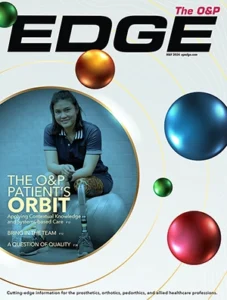An interdisciplinary research team at Worcester Polytechnic Institute (WPI), Massachusetts, has received a $1.2 million award from the National Science Foundation (NSF) to develop a smart-phone application that will help people with advanced diabetes and foot ulcers better manage their disease, with the intent of decreasing diabetes-related complications such as infections and amputations. The four-year project will be organized through WPI’s Healthcare Delivery Institute (HDI) in collaboration with diabetes and wound-care specialists at the University of Massachusetts (UMass) Medical School, Worcester.

Photograph courtesy of Ambro.
The proposed application would be installed on a smart phone and integrated wirelessly with a personal glucose meter and scale. The application would have embedded data and algorithms drawn from clinical experience that would track and archive blood-sugar levels and weight, and prompt patients with specific messages based on their weight and blood sugar readings over time. The application would also use the phone’s camera to capture and analyze images of foot ulcers, and deliver prompts with objective measures of the progress of their ulcers to help patients decide if staying home and dressing the wounds is sufficient or if a doctor’s visit is needed for further assessment.
“The application will provide relevant, personalized feedback for the patient that encourages them to make good decisions,” said Bengisu Tulu, PhD, assistant professor at WPI’s School of Business, a health information technology expert, and one of the project’s leaders. “The reality is that nearly all the management of a person’s diabetes is done by the patient, away from a doctor’s office or clinic. So we envision this new application as a way to help these patients achieve better outcomes.”
Tulu and Diane Strong, PhD, one of the project’s leaders, who is a professor in WPI’s School of Business and a health information technology expert, are founding members of HDI. Also working on the project are HDI executive council member Emmanuel Agu, PhD, associate professor of computer science at WPI, who will lead the software development for the new application; and Peder Pedersen, PhD, professor of electrical and computer engineering at WPI, who will work with the HDI team and direct the image-processing component of the application. Throughout the project, WPI students will participate in the research and development.
The WPI team will work closely with four colleagues at UMass Medical School: David Harlan, MD, professor of medicine and pediatrics and co-director of the Diabetes Center of Excellence at UMass Memorial Medical Center; Raymond Dunn, MD, professor of surgery and chief of plastic and reconstructive surgery at the medical center; Ronald Ignotz, PhD, adjunct professor of cell biology and research scientist in the Department of Surgery; and Sherry Pagoto, PhD, associate professor of medicine and a licensed clinical psychologist at the UMass Memorial Weight Center.
The first two years of the project are slated for technology research and development, leading to a prototype for refinement. If the development phase proceeds as planned, the second two years of the project will test the new application in a clinical trial at UMass Medical School.




